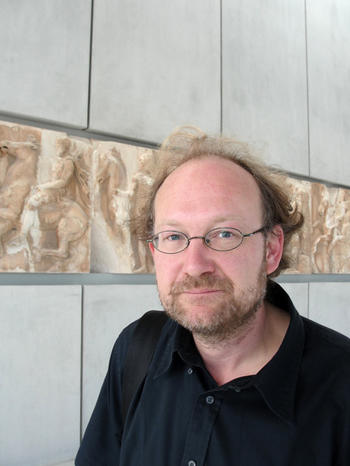Univ.-Prof. Mag. Dr. Roland Steinacher

Jun. – Jul. 2017, Okt. 2023 – März 2024
Institut für Alte Geschichte und Altorientalistik
Agnes-Heller-Haus
Innrain 52a
A-6020 Innsbruck
Austria
Roland Steinacher is full professor of Ancient History at the University of Innsbruck (since 2018). He graduated from the University of Vienna (dissertation 2002, second doctorate/Habilitation 2012) and worked in the following at the Austrian Academy of Sciences (ÖAW), the University of Vienna, at the FU Berlin (Humboldt Fellowship) and the universities of Erlangen (Humboldt Fellowship), Greifswald (Krupp Kolleg Senior Fellow), Bayreuth (teaching), Hildesheim (Guest Professorship) and Tübingen (Nachwuchsgruppenleiter).
He published a history of the Vandals in 2016 (Rise and Fall of Roman Barbarians – “Die Vandalen. Aufstieg und Fall eines Barbarenreichs”, Klett-Cotta, 2nd ed. 2017), a study on Rome and the barbarians (Rom und die Barbaren. Völker im Alpen- und Donauraum 300–600, Kohlhammer 2017) as well as more than 70 articles on Roman History and Late Antiquity, ancient and medieval ethnography and historiography, ecclesiastical History, ethnic identities and the transformation of the Roman world.
He is a Roman historian and works on the political, economic, institutional, and cultural history of the Empire between the first and sixth centuries AD as well as on the Transformation of the Roman World covering the first millennium and aspects of Early Medieval history.
2016 – 2017
Fellow am Alfried Krupp Wissenschaftskolleg Greifswald
2016
Gastprofessor an der Stiftung Universität Hildesheim 2016–2019; Humboldtstipendium für erfahrene Wissenschaftler am Friedrich-Meinecke-Institut der Freien Universität Berlin (bis 31.07.); Lehre an den Universitäten Innsbruck, Erlangen-Nürnberg, Bayreuth und Hildesheim
2015
Humboldtstipendium für erfahrene Wissenschaftler am Lehrstuhl für Alte Geschichte der Friedrich-Alexander-Universität Erlangen-Nürnberg; Lehre an den Universitäten Wien, Erlangen-Nürnberg und Hildesheim
2014
Projektleitung Jubiläumsfonds der Österr. Nationalbank: "Zwischen Po und Donau. Ethnische und soziale Identitäten des ersten Jahrtausends unserer Zeit"; Stipendiat der Gerda-Henkel Stiftung Düsseldorf; Lehre an den Universitäten Wien, Innsbruck und Hildesheim
2012
Habilitation an der Universität Wien; Venia docendi "Alte Geschichte und Altertumskunde"
2011 – 2013
Wissenschaftlicher Mitarbeiter: ERC advanced grant "Social cohesion, identity and religion in Europe, 400–1200 (SCIRE)" an der Universität Wien
2010
Stipendiat der Gerda-Henkel Stiftung Düsseldorf
2007 – 2009
Junior Scientist, Institut für Mittelalterforschung, Österr. Akademie der Wissenschaften
2006
Projektleitung Tiroler Wissenschaftsfonds "Grundlagen zur Erforschung von Spätantike und frühem Mittelalter im Tiroler Raum"
2002 – 2005
Wissenschaftlicher Mitarbeiter, Forschungsstelle für Geschichte des Mittelalters, Österr. Akademie der Wissenschaften
2002
Universität Wien, summa cum laude. Dissertation bei Herwig Wolfram: "Studien zur vandalischen Geschichte. Die Gleichsetzung der Ethnonyme Wenden, Slawen und Vandalen vom Mittelalter bis ins 18. Jahrhundert"
2001
Master of Advanced Studies – Historical Research and Archival Science; Mitglied des Instituts für Österr. Geschichtsforschung
1998 – 2001
62. Ausbildungslehrgang am Institut für Österreichische Geschichtsforschung
2023
Romanness and its Transformations ca. 300–800 CE
The Roman World was not a homogeneous zone of Romanness, although it tended to present itself that way. It was a broad tapestry of differing identities, often in multiple layers, that was held together by a central claim to control and by administrative and military structures that allowed to incorporate pre-existing regional, ethnic and civic identities and to transform them over time. When the Western Roman empire eroded in the 5th–7th centuries, new identities complemented the existing Roman and provincial identities in a dynamic process in which newly-defined peoples and polities began to emerge. I aim at selecting specific case studies to better understand these processes, their preconditions and the conflicts caused by them.
2017
Studying North Africa poses a variety of problems. Historical as well as archaeological research bears the burden of a colonial view on Africa's past tending to overemphasize Roman aspects. Berber (Numidian and Moorish) political entities together with Punic (Carthaginian) cities had a long history when Rome entered the African scene. The history of Roman North Africa in its narrow sense started with the forming of Africa vetus in 146 BCE, after the third Punic War and the destruction of Carthage. For the centuries to come, Rome relied on client kings in Numidia and Mauretania to secure the new province. The process of full annexation of North Africa finished a hundred years later during the early principate under emperor Claudius (41–54 CE) when Mauretania became part of the empire.
Forschungsschwerpunkte
Roman History, The Transformation of the Roman World, Ethnicity/Ethnic identities in Late Antiquity and the Early Middle Ages, Classical and Early Medieval Historiography and Ethnography, Ecclesiastical History, Roman North Africa: "Africa in the first millennium", Roman provinces in Northern Italy, the Alpine area, and the Balkans
2022
Steinacher, Roland; Tedesco, Paolo; Margreiter, Philipp: Guest Editors Volume 12/2022: Africa 500-1000. New Perspectives for Historical and Archaeological Research - Medieval Worlds, 01.01.2022: https://medievalworlds.net/medievalworlds_no16_2022?frames=yes
2017
Rom und die Barbaren. Völker im Alpen- und Donauraum 300–600 (Kohlhammer Urban-Taschenbücher 777, Stuttgart 2017).
Die Vandalen. Aufstieg und Fall eines Barbarenreichs (Klett-Cotta, Stuttgart 2016/2nd ed. 2017).
Wanderung der Barbaren? Zur Entstehung und Bedeutung des Epochenbegriffs „Völkerwanderung“ bis ins 19. Jahrhundert, in: ed. Hans-Joachim Gehrke/Kerstin Hoffmann/Felix Wiedemann, Vom Wandern der Völker. Zur Verknüpfung von Raum und Identität in Migrationserzählungen (Berlin Studies of the Ancient World 41, Berlin 2017) 65–93.
2014
Roland Steinacher/Guido M. Berndt, Arianism. Roman Heresy and Barbarian Creed (Routledge, Aldershot 2014).
